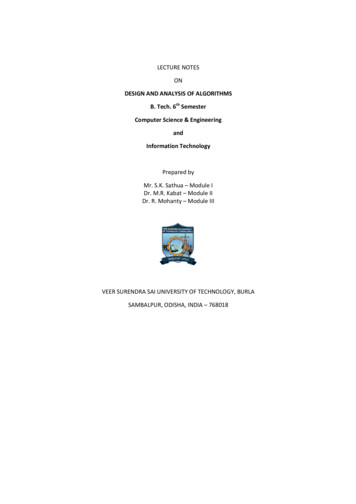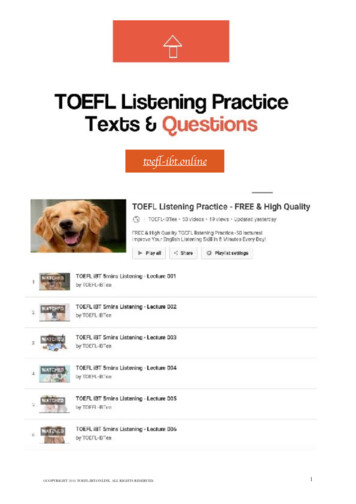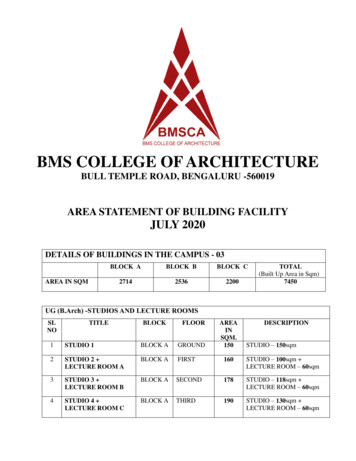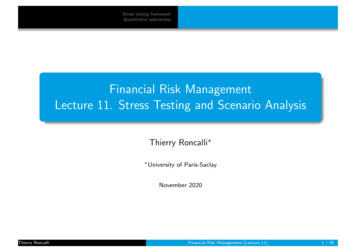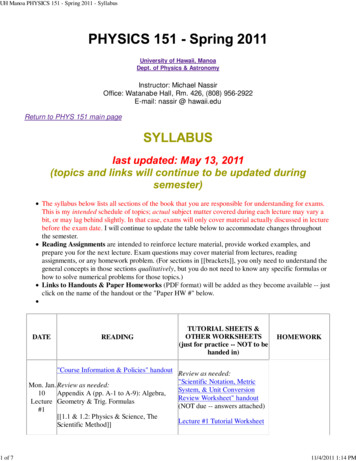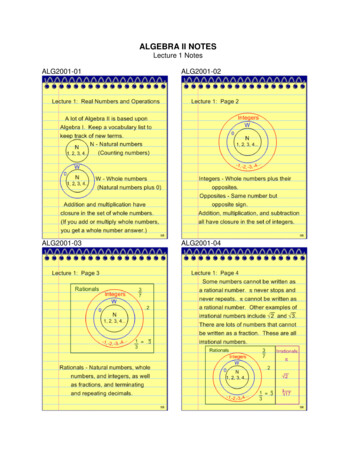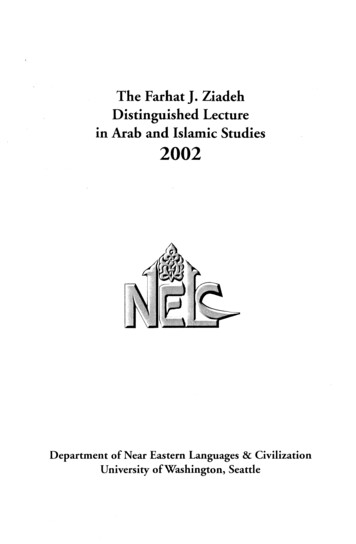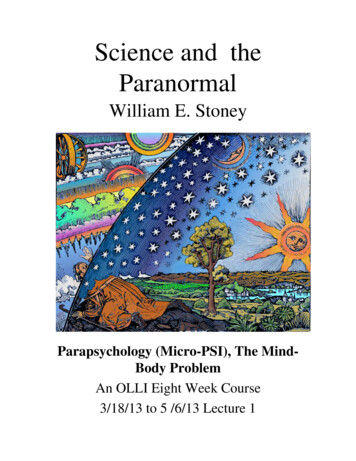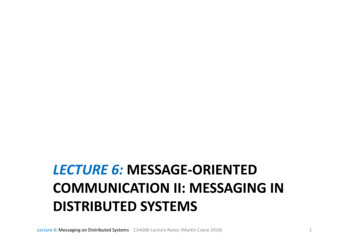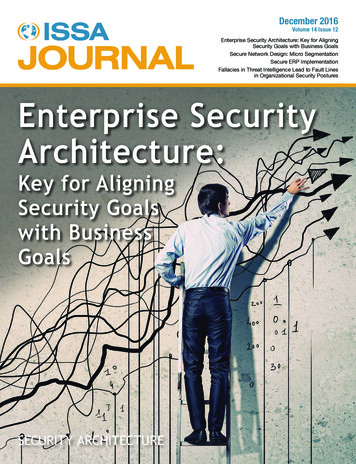
Transcription
29th Annual Mortenson Distinguished Lecture& iSchool Indaba onWhy Libraries,Why Librarians?Friday and Saturday, November 15 and 16, 2019 in IS 126, 501 E. Daniel, Champaign, IllinoisUniversity of Illinois School of Information Sciences (iSchool)Over the last decade the School of Information Sciences (a charter member of the iSchool initiative) changed its name,dropping the words library and graduate. Since 2007 it has retained 11 tenure stream faculty, 1 from computer science,engineering, or statistics, and added 23 more, 10 from those fields. It has added two degrees: a master’s in informationmanagement and a bachelor’s in information sciences. Other LIS schools have done similarly. The changes have been inpart market driven, as expected in difficult economic times and an expanding digital environment. They aim at newprofessions and new constituencies.This semester we have new leadership guiding the school and the MSLIS program. It’s a good time to get above the dayto-day and strengthen our understanding of the current and future importance of librarianship and related work forwhich we prepare so many of our students. This will help our LIS education prepare graduates to meet challenges andopportunities in the global library environment of the 21st century. So our forward facing questions here are:1. What makes a library?2. What makes a librarian?3. How might library education adjust towards what is important in librarianship?The Mortenson Center's longstanding interest in these questions brings us the perspective of two leading South Africancolleagues in Mortenson’s tradition of training and learning from librarians worldwide.Co-chairs Kate Williams and Clara M. Chu logos here
Why Libraries? is online in video formatVisit http://go.illinois.edu/whylibraries for the livestream and online chat during sessions. Video will bearchived at the same location. If you do not want to be on camera, let the cameraperson know in advance.About Friday’s lectureAt the epicenter of a changing higher education landscape is the rapiddevelopment of technology. This has significantly influenced the shaping of thehigher education landscape. The academic library is not exempt from thisinfluence of technology; in fact, it ought to be adding a new layer of support inthis changing higher education landscape. Within this paradigm, there iscontinuous demand for re-calibration of LIS practice and pedagogy, support bycommensurate technology, to deliver library and information services thataddress the issue of social justice. At no time in the history of academiclibrarianship have libraries been so vulnerable to becoming redundant.Paradoxically, this presents an ideal opportunity to exploit the potential tobecome noteworthy partners or collaborators in the evolving teaching andlearning and research processes of the higher education sector.The demands of flexible and robust academic library services that meet thedemands of an evolving user community and that remain relevant and fit forpurpose in a technology-driven age, are opportunities to be exploited. The recalibration of services and the introduction of new ones make provision for thedelivery of new and innovative services responding to the need for a paradigmshift in 21st century academic librarianship. In this digital era that propagates theadvancement and redefinition of the traditional roles of libraries, one of thegolden threads is that of social justice and inclusion of the marginalized. Thee isgrowing demand for the free exchange of knowledge between the global Northand global South to address the challenges of the global knowledge village. Bythe same token, there are demands for unique and relevant services such as thedemand for support of a decolonized higher education which has the dominoeffect of growing diamond open access scholarly communication, specificallypublishing, with a de-northernization agenda. This presentation explores such asocial justice perspective in relations to evolving LIS practice and pedagogy.—Reggie and Jaya Raju, University of Cape Town2
Friday, November 155-7pm – The 29th Annual Mortenson Distinguished LectureDeans' welcome by J. Stephen Downie, Professor and Associate Dean for Research“The evolving library profession and education driving social justice: A perspective from the Global South”Reggie Raju, Director of Research & Learning, University of Cape Town LibrariesJaya Raju, Professor and Head of the Department of Knowledge and Information Stewardship, University ofCape Town (remotely, for Q and A)Chair: Clara M. Chu, Mortenson Distinguished Professor and Director of the Mortenson Center for InternationalLibrary ProgramsReception to followSaturday, November 168:30 am – Continental breakfast9-10:20 am – Past/Present: The achievements of our libraries, librarians, and library educationAfter an evening of thinking globally, we start today with four stories of historical achievement. This will help usunderstand the potential of our hard-won library institutions. What have the public library, the academic library, andlibrary education accomplished? How did they do it?John Wilkin, Dean of Libraries and University LibrarianFred Schlipf, Director Emeritus, Urbana Free Library; Adjunct ProfessorEssie Harris, Manager, Douglass Branch, Champaign Public LibraryWelcome and Chair: Kate Williams, Associate Professor and Director, Community Informatics Research LabBreak10:40 am-Noon –Technology: How does it transform libraries, and vice versa?This session starts from broad technology transformations that are well underway. The Internet, the algorithm, big data.How do these change libraries? What are librarians and library programs doing with these new arrivals? What mightthey do?Robert Wedgeworth, Board Member, IMLS; UI University Librarian Emeritus; ALA Director Emeritus; IFLAPresident Emeritus; and iSchool alumLian Ruan, Director, Illinois Fire Service Library, and iSchool alumBharat Mehra, Professor and EBSCO Endowed Chair in Social Justice, University of Alabama, and iSchool alumRespondent: Yoo-Seong Song, Associate ProfessorChair: Jodi Schneider, Assistant Professor3
Noon-1 pm – Lunch in East Lobby and Room 1311-2:20 pm – Democracy: Does it depend on libraries and librarians? Or vice versa?This session starts with the people in the communities we serve. Libraries have been the arsenals of democracy, a nearubiquitous institution of book culture and rational thinking and learning. They are slowly becoming diverse, inclusive,and sustainable. Libraries are also public places playing new roles in service-poor communities. What professionalpractices do we hold onto? What are the new ones?Scott Walter, University Librarian, Illinois Wesleyan University, and former adjunct instructorLacy Spraggins McDonald, Director, History and Genealogy Library, Hayner Public Library, and iSchool alumCarol Inskeep, Urbana Free Library and iSchool alumRespondent: Emily Knox, Associate Professor, and iSchool alumChair: Inkyung Choi, LecturerBreak2:40-4 pm – Library education: What will we need to go forward?Where do history, technology, and democracy belong in the curriculum and the LIS program generally? What exactlyregarding technology do we need there? And what about democracy, culture, service, diversity, inclusivity,sustainability? And what else do we need to be teaching, learning, and studying?Maria Bonn, Associate Professor and MSLIS Program DirectorJoyce Latham, Associate Professor, University of Wisconsin at Milwaukee School of Information Studies, andiSchool alumTerry Weech, Associate Professor, and iSchool alumRespondent: Reggie Raju, Director of Research and Learning, University of Cape Town LibrariesChair: Kate Williams, Associate ProfessorIf you need disability-related accommodations in order to participate in any of the program, please speak with eventorganizers.4
Keynote, panelists, chairs, and organizersMaria Bonn is an associate professor and the MSLIS program directorin the School of Information Sciences at the University of Illinois atUrbana-Champaign. She teaches courses on academic librarianship andthe role of libraries in scholarly communication and publishing. Prior toher teaching appointment, Bonn served as the associate universitylibrarian for publishing at the University of Michigan Library, withresponsibility for publishing and scholarly communications initiatives,including Michigan Publishing. Bonn has also been an assistantprofessor of English at institutions both in the United States andabroad. She received a bachelor's degree from the University ofRochester, master's and doctoral degrees in American literature fromSUNY Buffalo, and a master's in information and library science fromthe University of Michigan.Inkyung Choi is a lecturer in the School of Information Sciences at theUniversity of Illinois at Urbana-Champaign. Choi earned her PhD inlibrary and information science from University of WisconsinMilwaukee and her MLIS from Syracuse University. Her researchinterests stem from her intellectual curiosity about social and culturalpluralistic perspectives, which influence ways of organizing knowledge.At the undergraduate level, Choi has taught courses in informationscience and technology as well as organization of knowledge. At thegraduate level, she has taught a course in organization of information.Clara M. Chu began her role as Director and Mortenson DistinguishedProfessor on June 1, 2015. She brings more than two decades ofprofessional knowledge and experiences to advance the mission of theMortenson Center in this dual role. In addition to having published inleading international journals, presented at conferences, trained andtaught around the world in English and Spanish, Dr. Chu has held successive leadership positions in ethnic, regional,national, and international professional library and information associations.She is President-Elect of the Association for Information Science andTechnology (ASIS&T), Co-Chair of the IFLA Building Strong LIS EducationWorking Group, and ALA representative on the U.S. National Commission forUNESCO. She is serving on the editorial boards of Libri, Library Trends, andInternational Journal of Information, Diversity, & Inclusion, and co-edits theInternational Insights Column of College & Research Libraries News. She hasbeen honored for her research, teaching and professional contributions locallyand nationally; most recently, she was awarded the 2018 American LibraryAssociation’s Beta Phi Mu Award for distinguished service to education forlibrarianship. Dr. Chu earned her bachelor’s degree (a major in Spanishlanguage and literature and a minor in psychology and French) from theUniversity of British Columbia and her master’s and doctoral degree in libraryscience from the University of Western Ontario. She comes to Illinois from The5
University of North Carolina at Greensboro (UNCG) where she was a professor and past chair of the Department ofLibrary and Information Studies. She joined UNCG in 2009 after approximately 20 years as a faculty member at theDepartment of Information Studies at the University of California at Los Angeles. Dr. Chu specializes in the socialconstruction of library and information use, practices, and systems that impact access and collective memory inmulticultural communities. Her transnational, ethnic minority, andmultilingual background provides her a distinctive and critical lens in thesocial study of information issues to transform professional practice andeducation internationally.J. Stephen Downie is associate dean for research and a professor at theSchool of Information Sciences, and the Illinois codirector of the HathiTrustResearch Center. He has been an active participant in the digital librariesand digital humanities research domains. He is best known for helping toestablish an vibrant music information retrieval research community. Since2005, he has directed the annual Music Information Retrieval EvaluationeXchange (MIREX). He also was a founder of the International SocietyMusic Information Retrieval (ISMIR) and its first president.Essie Harris, lifelong resident ofChampaign, became the Manager ofthe Douglass Branch of theChampaign Public Library in 2003.During her tenure, she spearheadedthe renovation of the branch in 2011by securing funding from the Liveand Learn Construction Grantthrough the Illinois State Library.The renovation doubled the size ofthe branch computer lab and gave ita much-needed face-lift. In 2018,Essie received the Hugh C. AtkinsonMemorial Award from the Illinois Library Association in honor of her lasting impact on library services in Champaign. In2019, the Champaign City Council recognized Essie‘s 50 years of service to the library and community with an honorarystreet dedication and reception on Essie Harris Day, October 9.Courtney Horry works as the Mortenson Center’s Office Support Specialist. Aftereleven years as an administrative professional Courtney joins the Mortenson Centerfor International Library Programs from New York where she served as ExecutiveAssistant to real estate, consulting & hedge fund management firms before movingto the Champaign area in August of 2018. She works excitedly alongside Dr. Chu toaid in the Mortenson Center’s contribution to international education,understanding and peace.6
Carol Inskeep is a librarian at The Urbana Free Library who organizeslibrary programs for all ages. She is especially interested in how the librarycan build community, support the local art and music scene, and buildunderstanding and opportunity for marginalized communities.Emily Knox is an associate professor in the School of Information Sciencesat the University of Illinois at Urbana-Champaign. Her book, Book Banningin 21st Century America (Rowman & Littlefield) is the first monograph inthe Beta Phi Mu Scholars’ Series. She also recently edited TriggerWarnings: History, Theory Context (Rowman & Littlefield) and co-editedFoundations of Information Ethics (ALA). Her articles have been publishedin the Library Quarterly, Library and Information Science Research, andthe Journal of Intellectual Freedom and Privacy. Emily serves on theboards of the Association for Information Science & Technology, Beta PhiMu, the Freedom toRead Foundationand the NationalCoalition AgainstCensorship. Her research interests include information access,intellectual freedom and censorship, information ethics,information policy, and the intersection of print culture andreading practices. She is also a member of the MappingInformation Access research team. She was the Associate Directorand Reference Librarian at St. Mark's (now Keller) Library of theGeneral Theological Seminary of the Episcopal Church for fiveyears. Emily received her Ph.D. from the doctoral program at theRutgers University School of Communication & Information. Hermaster’s in library and information science is from the iSchool atIllinois. She also holds a B.A. in Religious Studies from SmithCollege and an A.M. in the same field from The University ofChicago Divinity School.Joyce Latham (PhD, Illinois) is an associate professor at the University ofWisconsin at Milwaukee School of Information Studies. Latham comes toLIS education after an extended career in libraries. With a background incataloging and technical services, she became entwined with retrospectiveconversion and automation projects for public libraries. She was the headof Automated Services for the Southern Maryland Regional Library andworked on the development of the statewide Sailor Project. From there shewent to Chicago Public Library as the head of Information Technology. Afterthree years at the University of Illinois studying the social influences on thedevelopment of intellectual freedom in public libraries, she went to upstateNew York as a library / public library system director. With the completionof her dissertation she came to the School of Information Studies, whereshe specializes in public libraries, intellectual freedom and library history.Latham’s alternative perspective on the history of libraries allows her7
research to focus on the activist role of librarians in thedevelopment and distribution of cultures influencing Americansociety.Lacy Spraggins McDonald (GSLIS MS 2011) manages theGenealogy & Local History Library branch of The Hayner PublicLibrary District in Alton, Illinois. She has been with Hayner sinceFebruary 2012. Lacy holds a master’s degree in Library andInformation Science and a Graduate Certificate in Rare Book andSpecial Collections Librarianship from the University of Illinois atUrbana-Champaign. She grew up in Arkansas and has since lived inIowa, Minnesota (where she received a BA in psychology fromCarleton College), Florida, and several cities in Illinois. Lacycurrently lives in Godfrey, Illinois with her husband Jeff and theirtwo children. She serves on the board of the Madison County(Illinois) Historical Society and the Vintage Voices Alton Cemeterytour committee. Lacy has also consulted on television shows forPBS and Investigation Discovery, as well as researched periodcostumes for a Hollywood movie production.In January 2019, Bharat Mehra (PhD, Illinois) joined the Schoolof Library and Information Studies at the University of Alabamaas Professor and EBSCO Endowed Chair in Social Justice. FromJanuary 2005 – December 2018 he was a faculty member in theSchool of Information Sciences at the University of Tennessee.His research focuses on diversity and social justice in library andinformation science (LIS) and community informatics or the useof information and communication technologies to empowerminority and underserved populations to make meaningfulchanges in their everyday lives. Mehra has applied actionresearch to further engaged scholarship and communityengagement while collaborating with racial/ethnic groups,international diaspora, sexual minorities, rural communities,low-income families, small businesses, and others, to representtheir experiences and perspectives in the design of communitybased information systems and services. He primarily teachescourses on public library management, collection development,resources and services for adults, diversity services inorganizations, and grant development for informationprofessionals. In the position of the EBSCO Endowed Chair in Social Justice Mehra is very excited to have the opportunityto shape the LIS area of the college-wide doctoral program through a concentration in social justice research. Itresonates deeply with his lifelong commitment to further diversity, fairness, and justice working with underservedcommunities on the margins of society. Further, in this unique progressive collaborative initiative Mehra looks forwardto playing a leadership role in mobilizing the LIS and communication professions in engaged scholarship to help expandtheir traditional definition, scope, extent, representation, and relevance in the 21st century.8
Jaya Raju is a Professor and Head of the Department of Knowledge andInformation Stewardship (Humanities Faculty) at the University of CapeTown. She has a PhD in Information Studies. She has researched andwritten extensively in the area of LIS education and its implications forthe LIS services work environment. Jaya Raju served as Editor-in-Chiefof the South African Journal of Libraries and Information Science from2013 to 2018. She also serves on the Editorial Advisory Boards of theSouthern African Journal of Communication & Information Science;African Journal of Libraries, Archives and Information Science;International Journal of Information, Diversity & Inclusion; Libri: TheInternational Journal of Libraries and Information Studies, and DeGruyter’s Open Information Science. She is co-editor of the ALISE BookSeries on LIS education and research. She has published in peerreviewed national and international journals and presented papers atlocal, national and international conferences. She is currently Co-Chairof IFLA’s Building Strong LIS Education (BSLISE), an active globalnetwork of LIS educators and researchers. In 2018, Jaya Raju becameSubject Chair for Library and Information Science on the ScopusContent Selection & Advisory Board.Reggie Raju is the Director (Research & Learning) at theUniversity of Cape Town Libraries. He has been in academiclibraries for more than 35 years. He holds a PhD inInformation Studies. He is the author of several publicationsin peer-reviewed national and international journals,chapters in books and a book publication. His research focusis on research librarianship with an emphasis on open accessand library publishing. He is currently a member of theAcademic and Research Libraries Standing Committee of IFLAas well as being the convenor of its Special Interest Group:Library Publishing. Reggie is currently the Chair of SPARCAfrica and isdriving thesocial justiceagenda of open access for Africa. He serves on the editorial board ofJournal of librarianship and scholarly communication.Lian J. Ruan, Head Librarian at the University of Illinois Fire ServiceInstitute (IFSI) and Director of the IFSI International Programs hasresearch interest on use and users of information and internationallibrarianship. She has served on multiple capacities, including Presidentof the Chinese American Librarians Association (CALA) and CALAExecutive Director. She serves on IFLA Information Literacy StandingCommittee. She received numerous awards, including the University ofIllinois Chancellor's Academic Professional Excellence award, the SLADiversity Leadership Development Program award, CALA DistinguishedServices Award and Illinois Academic Librarian of the Year Award. Her9
library was named the Finalist for the 2015-2017 IMLS National Medal for Museum and Library Service (The NationalMedal is the nation’s highest honor given to museums and libraries for service to the community). She has organized theChinese Librarians Scholarly Exchange Program from 2005-2019 and trained over 423 librarians from 142 organizationsall over China. She was named as one of 150 for 150 (celebrating the Accomplishments of Women at the University ofIllinois at Urbana-Champaign that is part of the U. of I.’s sesquicentennial ). She received theJCLC Advocacy Award at the 2018 3rd National JointConference of Librarians of Color in Albuquerque, NewMexico in recognition of her significant efforts to improve andpromote library services to culturally diverse communities.She was honored and recognized by the Illinois Firefighter’sAssociation Inc. for her accomplishments and contributions toIllinois fire service.Fred Schlipf has been hanging out in library buildings sincethe early 1940s and has been working for libraries andteaching about libraries and consulting on library buildingssince he was 17. He has been a library school faculty memberfor over 50 years, and he spent nearly 33 years as director ofThe Urbana Free Library. He has done formal buildingconsulting for between 150 and 200 libraries and quickconsulting for many more, and he visits library buildingseverywhere he goes.Jodi Schneider is an assistant professor at the School of InformationSciences. She studies the science of science through the lens ofarguments, evidence, and persuasion. She is developing Linked Data(ontologies, metadata, Semantic Web) approaches to managescientific evidence. Schneider holds degrees in informatics (Ph.D.,National University of Ireland, Galway), library & information science(M.S., UIUC), mathematics (M.A., UT Austin), and liberal arts (B.A.,Great Books, St. John's College). She has worked as an actuarialanalyst for a Fortune500 insurancecompany, as the giftbuyer for a smallindependentbookstore, and inacademic science andweb libraries. She hasheld research positions across the U.S. as well as in Ireland, England,France, and Chile.Yoo-Seong Song is an associate professor at the School of InformationSciences and also holds an appointment at the University Library. Hereceived his MBA from the University of Iowa and MSI from theUniversity of Michigan. Prior to coming to the University of Illinois, he10
was a senior associate at Ernst & Young, specializing in e-commerce, high-tech, and telecommunications. He also workedat Accenture as a consultant and a market intelligence analyst at Tellabs. As an entrepreneur, he co-founded twoinformation service firms in Korea—Logit International and Heavenly Seeds Media. He is currently working withdomestic and international corporations to provide real-world projects via his experiential learning classes.Scott Walter is University Librarian Professor, University CopyrightOfficer, and Co-Interim Chief Technology Officer at Illinois WesleyanUniversity. He previously served as University Librarian at DePaulUniversity and in various leadership roles for libraries at the Universityof Illinois Urbana-Champaign, Washington State University, The OhioState University and the University of Missouri–Kansas City. He receiveda Ph.D. in higher education administration at Washington StateUniversity, both a master of library science and a master's degree in thehistory and philosophy of education at Indiana University, plus master'sdegrees at American University and at Georgetown University, wherehe also earned his bachelor's degree in Russian and linguistics.Robert Wedgeworth was the founding President and CEO of ProLireracyin 2000 serving until his retirement in 2007. In 2010 President BarackObama appointed him the board of the Institute of Museum and LibraryServices (IMLS) where he continues to serve. Wedgeworth received anA.B. from Wabash College, an M.S. from the University of Illinois and aPh.D. from Rutgers-The State University of New Jersey. During his longcareer as a librarian, library association executive and educator heworked asacquisitions librarian at Brown University 1966-69 and taught atRutgers 1969-72. From 1972-1985 he led the transformation of theAmerican Library Association (ALA), expanding its membership,adding new revenue sources and developing new facilities. He servedas the last Dean of the School of Library Service, Columbia Universityfrom 1985 until its closing in 1992. He was University Librarian andProfessor of Library Administration at the University of Illinois 19921999. From 1991 to 1997 Wedgeworth served as president of theInternational Federation of Library Associations and Institutions(IFLA), developing the first global electronic network of libraries of alltypes and adding new programs on Freedom of Access to Informationand Freedom of Expression (FAIFE) and Copyright and Other LegalMatters (CLM). Wedgeworth has received many honors and awardsincluding the Lippincott Award and Melvil Dewey Medal from theALA, the McGovern medal from the Medical Library Association andthe medal of achievement of the International Council of Archives.He has also been awarded six honorary degrees most recently fromSyracuse University, 2008. Wedgeworth resides in Chicago with hiswife, Chung-Kyun, also a retired librarian. They have one daughter, ajournalist and web manager.11
Dr. Terry L. Weech is a member of the faculty at the Universityof Illinois iSchool. Dr. Weech has taught at Mississippi Universityfor Women, the University of Iowa, the University of NorthCarolina, Chapel Hill, and at Emporia State University, Emporia,Kansas. He has served as Chair of the International Federationof Library Associations (IFLA) Division of Education andResearch, the Chair of the IFLA Education and Training Sectionand the Chair of IFLA Library Theory and Research Section. Hehas been active in the American Library Association,participating in numerous ALA accreditation External ReviewPanels and from 2014-2018 a member of the American LibraryAssociation Committee on Accreditation (Chair 2017-18). Hisresearch interests include collection development, librarycooperation and networks, library administration, economics ofinformation, government information resources, and libraryeducation with a special focus on international issues in LIS education. Internationally he has lectured in more thantwenty countries. He currently teaches courses dealing with International Librarianship, the Economics of Informationand Librarianship and Society. In 2017, he received the Scroll of Appreciation from the International Federation ofLibrary Associations and Institutions (IFLA) for distinguished contributions to IFLA and the Library Profession, especiallyin the internationalization of Library and Information Science Education.John Wilkin assumed the position of Dean of Libraries and UniversityLibrarian at the University of Illinois at Urbana-Champaign in 2013. Inaddition, he served as Interim Vice Chancellor for Academic Affairs andProvost Designate at Illinois from February 2017 through January 2018.Previously, Wilkin served as Executive Director, HathiTrust and in a variety ofadministrative roles (including interim library director) at the University ofMichigan. Under Wilkin’s leadership, Michigan’s Digital Library ProductionService pioneered a number of large-scale digital library efforts, includingMaking of America, the Humanities Text Initiative, PEAK (a system deliveringElsevier’s journals), and putting the Middle English Dictionary online.Kate Williams is an associate professor at the School of Information Sciencesat the University of Illinois at Urbana Champaign. My research asks this: Iscommunity possible in the digital age? I follow in the footsteps of the earlyurban sociologists, who debatedwhether community was possiblein the industrial age. Part of this is:What is the role of the publiclibrary here? And how do peopleget and give tech help? Thesehelpseeking "informatics moments," as I call them, are in a sense the buildingblock of humanity's move into digital society. I find that people are moreingenious and resourceful than they get credit for. Professional librarians whou
University of Illinois at Urbana- Champaign. Choi earned her PhD in library and information science from University of Wisconsin-Milwaukee and her MLIS from Syracuse University. Her research interests stem from her intellectual curiosity about social and cultural pluralistic perspectives, which influence ways of organizing knowledge.
